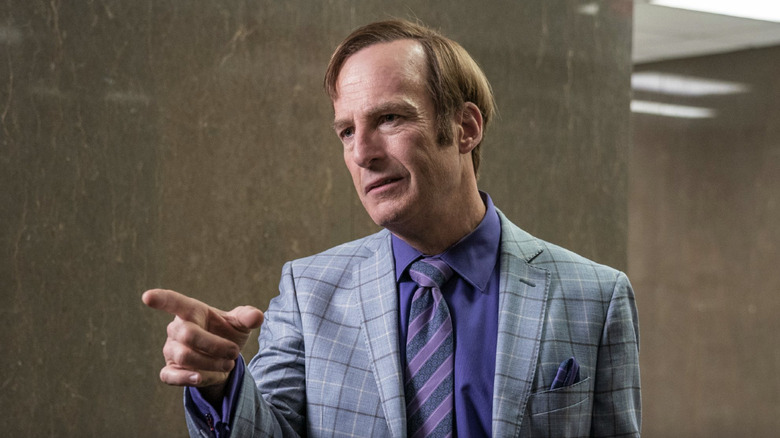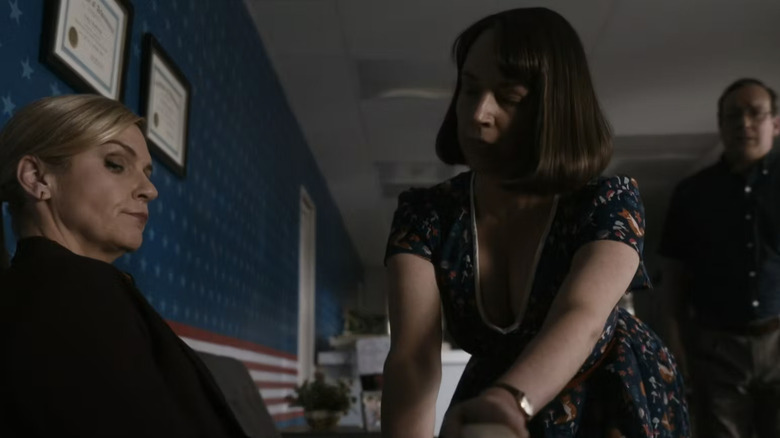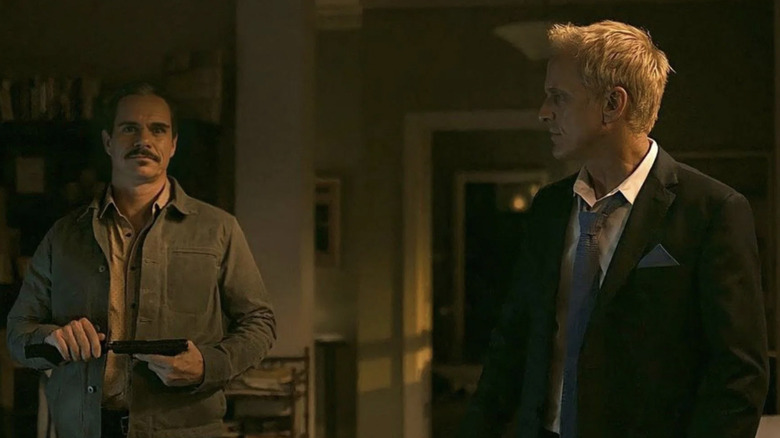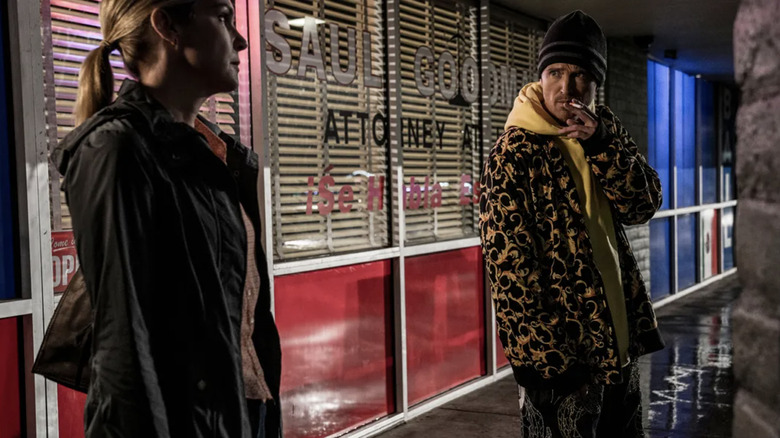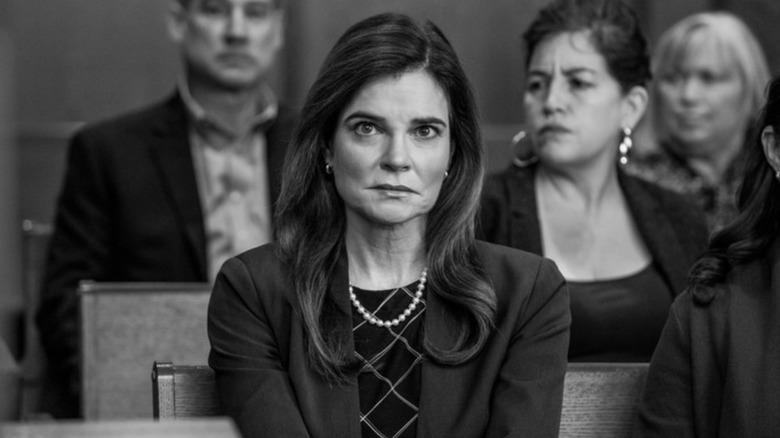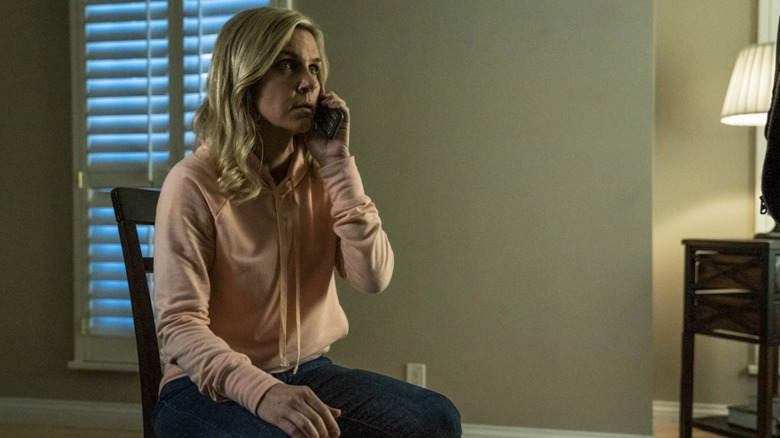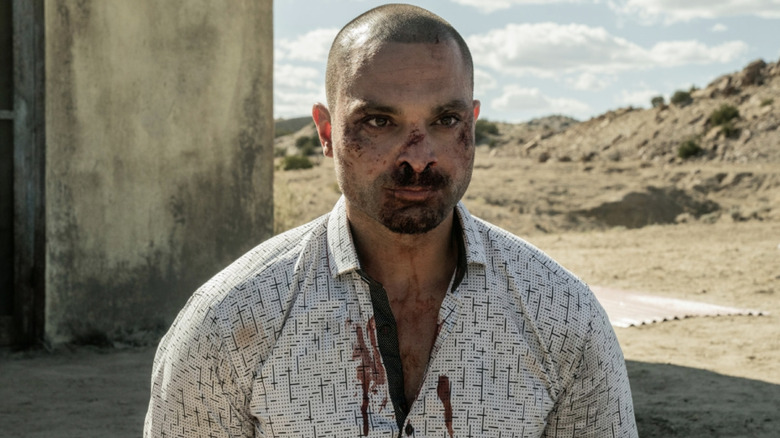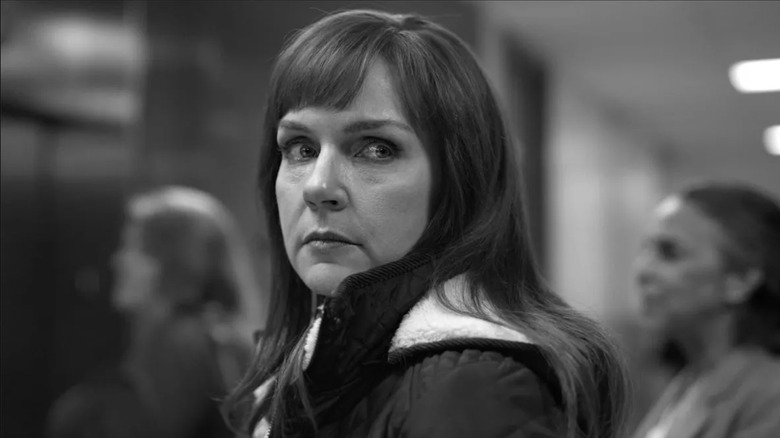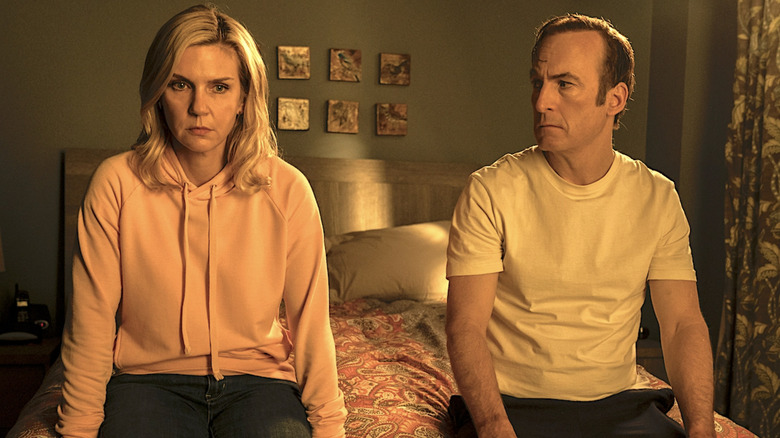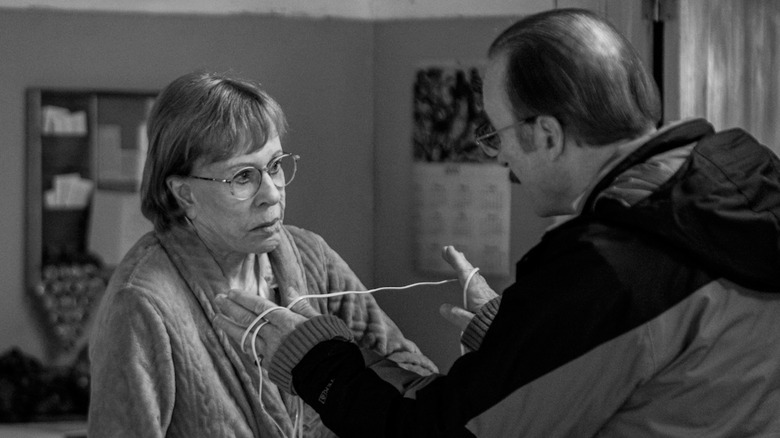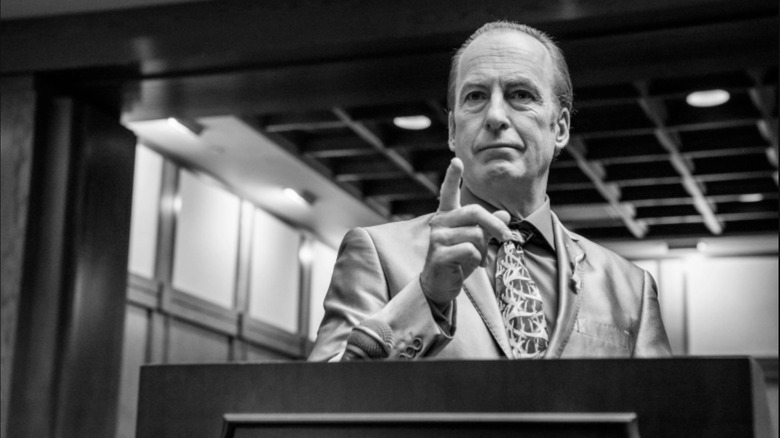10 Most Shocking Moments Of Better Call Saul's Final Season
One of the best television shows ever to grace our screens has ended, and with it, the "Breaking Bad" Universe that Vince Gilligan and Peter Gould created. "Better Call Saul" aired its series finale this past Monday, ending its incredibly well-crafted sixth season. This last stretch of the series featured massive tonal shifts and particularly dark imagery, which paired well with the fact that Saul Goodman was well on his way to getting the ending he deserved.
Some of the most shocking moments in this season are surprising not only in the context of the final season but also in the series as a whole. Unexpected character decisions, interactions, and pacing have led to this final season being one that audiences won't soon forget. With that being said, we at /Film have compiled the 10 most shocking moments of the final season of "Better Call Saul."
Spoilers follow for the sixth and final season of "Better Call Saul."
Kim threatens the Kettlemans
Kim Wexler's unexpected darker side gives this moment all of the shock value it needs. Attempting to taint Howard's reputation and bring the Sandpiper Settlement case to a close, Saul and Kim first want to plant the idea in the heads of the legal community that Howard is a substance abuser. Turning to Craig and Betsy Kettleman, Saul and Kim want to use their (false) word of mouth as just one small step in their larger plan to undermine Howard. When the Kettlemans refuse, Kim resorts to blackmail to keep them from revealing what they know about Saul and Kim's plans for Howard.
Kim's means of threatening them is a double-edged sword because while she does it out of a place of helping those the Kettlemans are scamming in their tax fraud services, she's also doing it to benefit herself and Saul. Usually, Saul uses his legal knowledge to benefit himself, while Kim uses it to help others. Odenkirk's performance in this jarring scene helps to accentuate Kim's darker turn, as even Saul seems frightened by Kim at this moment. It's a scene that shows Kim's dangerous potential if she continues down this path with Saul, which plays into her reasoning of leaving it all behind later in the series.
Lalo and Howard's first meeting
A character interaction that almost no one expected also provided one of the darkest moments in the entire series. The first half of the season 6 of "Better Call Saul" revolves around two stories running parallel to each other: Saul and Kim attempting to undermine Howard's reputation, and Lalo trying to expose Gus Fring to the Salamanca cartel.
This shocking moment comes when these two worlds finally collide, with Howard confronting Saul and Kim in their home late at night, right when Lalo arrives to use them as pawns in his game against the chicken man. This ever-so-brief crossing over of two very different worlds ends as well as you'd expect, with Howard dead on the floor and Saul and Kim's lives forever changed.
Aside from other deaths in the series like Chuck McGill or Marco, Jimmy's life hadn't had a lot of profoundly personal loss up until now. Moreover, this was a death Jimmy witnesses up close, making it more traumatizing for himself, Kim, and the audience. "Better Call Saul" season 6 is all about consequences, and this shocking moment in the mid-season finale serves as just one of many that Jimmy has to live with going forward.
Kim and Jesse's smoke break
While many were anticipating Walter White and Jesse Pinkman's appearance in the final season of "Better Call Saul," not many were expecting the interaction we got in the penultimate episode of the season titled "Waterworks." Not only do we briefly get to see Kim Wexler during the "Breaking Bad" era of Albuquerque, but we also get to see her interact with Captain Cook himself, Jesse Pinkman.
Aaron Paul and Rhea Seehorn play the scene subtly as possible because it's a conversation between two strangers. The scene isn't as "shocking" as others on this list, but it's unexpected and surprising. Besides that, the meeting has its own meaningful purpose besides fan service.
Jesse's inquisitive nature leads to some brief retrospection on Kim's part, with the character fully realizing that the Jimmy she knew is gone (for now). Kim only briefly answers Jesse's question about whether Saul Goodman is a good lawyer with, "When I knew him, he was." It's a melancholic moment that ends one story and teases the beginning of another, with Jesse's presence reminding the audience that there is still so much to this story left.
Marie Schrader confronts Saul
This was a "Breaking Bad" cameo that not a lot of people expected to see and welcome addition to the final season of "Better Call Saul." The series finale, "Saul Gone," sees Saul Goodman finally face the music. Being outed by Marion and her handy life alert, Saul is taken into custody after being found by the police. When Saul meets the prosecuting team, he gets a brief look at Marie Schrader, and the audience gets as much vested interest in her presence as Saul does.
In retrospect, Marie's inclusion in the finale makes perfect sense because Saul, at this point, is the only one left to answer for the destruction wrought upon her and many others' lives throughout the two shows. With Walter dead and Jesse disappeared, all that remains is Saul. Marie's anger towards him comes from a sense of desperation, and the writers' of "Better Call Saul" and their ability to make a cameo as small as this one feel significant and well developed as this makes this shocking moment feel earned.
Kim's assassination attempt
Kim Wexler is a lot more out of her comfort zone in this final season of "Better Call Saul," from the blackmail mentioned previously to her role as an assassin in Lalo's grand schemes. Meant as a distraction so that he could get into the industrial laundry, Lalo sends Kim (originally meant to be Jimmy) out with a gun to kill Gus Fring. Such a plan was never meant to succeed, but Kim's dedication to it is what makes this scene so shocking and intense.
Not only was it shocking to see Jimmy so willingly send Kim out, but it was just as surprising to see how far Kim was willing to go to ensure her husband's safety. The camerawork, score, and lighting set up some of what is undoubtedly one of the tensest scenes of the series. Kim's long shadow as she walks towards Fring's house ready to pull the trigger has her deeply set into this new world that Saul Goodman was just barely beginning to embrace.
As surprising as the scene was, it also helped to solidify the deep love and respect that Jimmy and Kim have for each other, and the great lengths the two would go to in order to keep the other safe. This shocking scene could be considered something of a tease of what's to come in the final episode of the show.
The fall of Nacho Varga
Nacho's grisly end was a shock to witness, even if it was one at his own hands. Despite never being involved in "Breaking Bad" (only ever mentioned in that now infamous "Lalo" name drop scene), there was still some hope that one way or another, Nacho would find a way out of the mess he put himself in. However, after playing into Gus Fring's hands and being used as a fall guy for some of Fring's most significant blows to the Salamanca Cartel, Nacho has no choice but to die a pawn.
Nacho's story had been the darkest and most nerve-wracking of the series, and his on-the-run life style in season 6 had been building up what would no doubt be an emotionally cathartic conclusion for Varga.
Surrounded by his enemies, Nacho gets the last word and is able to go out on his own terms. As opposed to the torture at the hands of the Salamancas like some viewers were expecting, Nacho instead takes his own life in one last defiant act. The scene is an abrupt and brutal end to a tragic character, and the fact that this was the best possible outcome for the character in this scenario speaks volumes to the darkness of this final season.
Kim's confession (and waterworks)
Kim's efficiency in doing something when her mind is made up is a quality that continued to have massive ramifications in the final season of "Better Call Saul." Her determination to continue with the plan for Howard's downfall leads to his death, and such decisiveness on her part comes into play again after her phone call with Gene in "Waterworks."
After pleading with Gene to turn himself in, Kim is met with unexpected aggression from the man formerly known as Jimmy McGill, as he calls for her to do the same because of her involvement in Howard Hamlin's murder. It's an angry challenge that Gene didn't think twice about, but it stays with Kim long after the phone call ends.
Kim's resolve, which had seemingly disappeared at this point in the black and white flash forwards, returns with a vengeance. Her detailed affidavit about the events on the night of Hamlin's death and immediate trip to Albuquerque make for an incredible turn of events in the life of Kim Wexler. Her confession and subsequent outpouring of emotions following it are powerful moments that only help to solidify her character as one who is in control of her life and morality.
Kim resigns her law license
Let's just face it: with how much she's brought up in this list, the character of Kim Wexler is full of surprises in season 6 of "Better Call Saul." Since the series first began airing, fans speculated to no end about how her story would end, given that she is never mentioned in "Breaking Bad." Would she die as a result of Jimmy's descent into criminal activities? Would she be arrested for one reason or another? It only feels right that Kim's absence from "Breaking Bad" and the life of Saul Goodman is entirely her own doing. After a memorial service for Howard Hamlin, Kim remains mysteriously quiet and distant from Jimmy until it's finally revealed; that she's through being a lawyer, and she chooses to leave Jimmy and Albuquerque behind.
The revelation is a shock both to Jimmy and the audience, who see she's already practically done packing. No one can change her mind; before viewers can process it, she is long gone, leaving Jimmy to completely embracing his Saul Goodman persona. Kim's decision to remove herself from a morally (and sometimes physically) dangerous environment is a lot more sensible of a conclusion than many were expecting, making it one of the most shocking moments of the show's final season.
Gene threatens Marion
Perhaps the most out-of-character moment that was both frightening and shocking comes from season 6, episode 12, "Waterworks." Towards the end of the episode, after being found out by Marion in a beautifully shot scene, Gene's demeanor suddenly changes, becoming a threatening individual. Grabbing her telephone cord and creepily wrapping it around his hands, Jimmy/Saul/Gene is practically unrecognizable at this point.
Saul Goodman had always made money at other people's expense, but he was hardly the one to do the dirty work. There was hardly ever anything physically threatening about Jimmy, but now, with his identity and freedom on the line, he suddenly has a sinister presence. The scene has him slowly approaching and speaking to Marion as if he intends to harm her. At the end of the day, Jimmy doesn't give in to his darker nature and instead makes a run for it, exposed by Marion as Saul Goodman.
The scene was a close call, though, and shows the potential the character of Saul Goodman has to go to even darker, almost Heisenberg-like levels of crime.
Jimmy McGill casts out Saul Goodman
Almost all of "Saul Gone," the series finale of "Better Call Saul," seems to imply that Saul Goodman is back to his old ways. When his legal defense asks how he sees this ending, he responds with a coy, "Like it always does, with me on top." Goodman paints a tragic picture of himself as a victim of Heisenberg, constantly living in fear that he would be killed for opposing him. It's sickeningly entertaining to watch until Kim Wexler gets dragged into the mix.
When there is even a hint of Kim being punished for something he was primarily responsible for, Jimmy McGill makes his triumphant return. In the final courtroom scene of the series, Jimmy puts Saul Goodman behind him, metaphorically killing the persona and owning up to all of his crimes in one last glorious performance.
Taking credit for helping Walter White ascend in the drug trade, fabricating the circumstances surrounding Howard Hamlin's death, and blaming himself for his brother taking his own life, Jimmy puts away the Saul Goodman side of himself for good, at the cost of an 86-year prison sentence. The scene is a shocking turn of events, and this final episode perfectly encapsulates the essence of both Jimmy McGill and Saul Goodman. Although his fellow prison inmates and the outside world will always see him as Saul Goodman, at the end of the day, James McGill won the day. This shocking courtroom scene is without a doubt one of the most bittersweet moments in the entire series.
